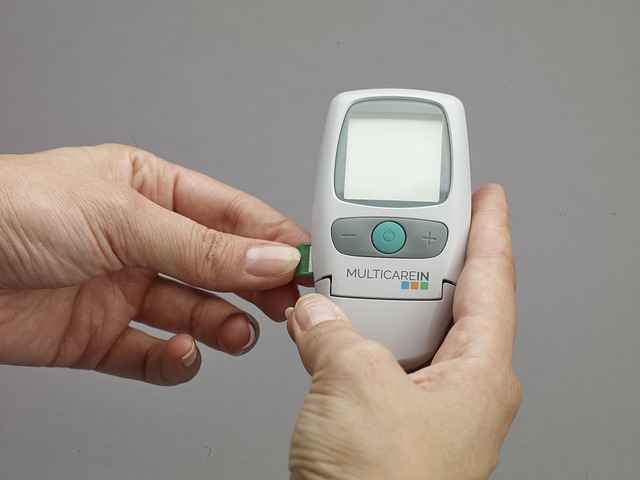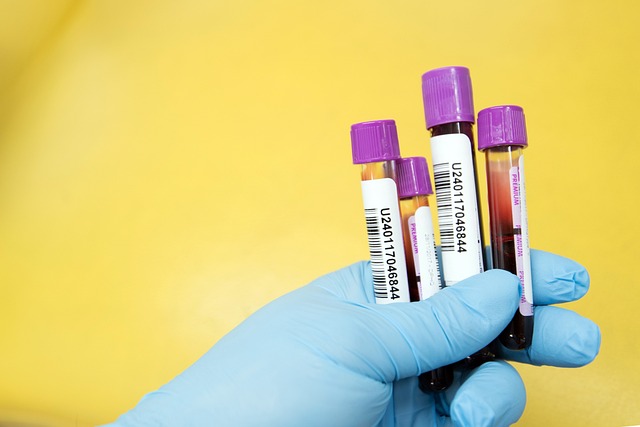Vitamin B12 plays a key role in DNA synthesis, red blood cell formation, and brain and nerve health. Its deficiency can lead to anemia, cognitive decline, and neurological issues, with symptoms like fatigue and gastrointestinal problems. In the UK, the National Health Service (NHS) uses blood tests to detect B12 levels effectively, including a comprehensive Iron Blood Test UK that also measures iron levels, total iron-binding capacity (TIBC), and ferritin. These tests are vital for diagnosing deficiencies early, enabling prompt treatment through dietary adjustments or supplementation to mitigate symptoms and improve health outcomes. Individuals with potential B12 deficiency symptoms should seek medical advice and undergo the Iron Blood Test UK for accurate diagnosis and personalized care. Regular monitoring is crucial, especially for those at higher risk like older adults, vegetarians, and vegans, as it allows for timely intervention to prevent adverse health effects. Treatment may include B12 injections or high-dose oral supplements, with follow-up tests necessary to ensure levels are returning to a healthy range. The Iron Blood Test UK is an essential tool in managing B12 deficiency and maintaining overall well-being.
Vitamin B12 is a nutrient pivotal for maintaining optimal health, playing a key role in DNA synthesis, energy production, and brain function. Its deficiency can lead to anemia and neurological issues, underscoring the importance of early detection. Blood tests, particularly the Iron Blood Test UK, serve as reliable diagnostic tools for assessing B12 levels. This article delves into the significance of Vitamin B12 in health maintenance, outlines the process and importance of blood testing for B12 detection, and guides you through interpreting your results. Understanding these aspects can empower individuals to take proactive steps towards their well-being.
- Understanding Vitamin B12 Deficiency and Its Implications for Health
- The Role of Blood Tests in Detecting Vitamin B12 Levels: A Guide to Iron Blood Test UK Procedures
- Navigating Your Results: Interpreting Vitamin B12 Blood Test Outcomes and Next Steps
Understanding Vitamin B12 Deficiency and Its Implications for Health

Vitamin B12 is an essential nutrient that plays a pivotal role in maintaining optimal health. It is integral to the production of DNA and red blood cells, as well as for proper brain function and nerve health. A deficiency in this vital vitamin can lead to anemia and neurological issues, including memory loss, mood disturbances, and diminished cognitive function. Symptoms of B12 deficiency may include fatigue, weakness, constipation, loss of appetite, and nerve problems. In the UK, the National Health Service (NHS) offers blood tests to measure serum vitamin B12 levels, which is a reliable method for diagnosing deficiency. The iron blood test, often referred to as a full blood count (FBC), can also be part of the diagnostic process, as low iron levels can sometimes accompany B12 deficiency and contribute to similar health implications. Detecting a B12 deficiency early through these tests allows for timely intervention with dietary changes or supplementation to prevent the progression of symptoms and to improve overall well-being. For individuals in the UK experiencing concerns related to B12 levels, consulting healthcare professionals and undergoing recommended blood tests is crucial for accurate diagnosis and effective management of Vitamin B12 deficiency.
The Role of Blood Tests in Detecting Vitamin B12 Levels: A Guide to Iron Blood Test UK Procedures

Blood tests play a pivotal role in the detection of Vitamin B12 deficiency, offering a reliable and non-invasive method to assess an individual’s vitamin levels. In the UK, the Iron Blood Test is often utilized as a screening tool for B12 deficiency alongside other haematological parameters. This test measures the concentration of iron, total iron-binding capacity (TIBC), ferritin, and Vitamin B12 in the blood. For individuals concerned about their B12 levels, understanding the Iron Blood Test UK procedures is essential.
The process begins with a healthcare professional taking a sample of blood, typically from the inner elbow or the back of the hand. This sample is then sent to a laboratory for analysis. The results will indicate whether an individual has sufficient B12 levels or if there is a deficiency present. It’s important for those at risk of B12 deficiency, such as the elderly, vegetarians, and vegans, to undergo regular Iron Blood Tests UK to monitor their vitamin status. Early detection through these tests allows for timely intervention, which can prevent the complications associated with a deficiency in this vital nutrient. Those who receive a diagnosis of B12 deficiency may require dietary adjustments, supplementation, or medical treatment to restore their levels and maintain overall health.
Navigating Your Results: Interpreting Vitamin B12 Blood Test Outcomes and Next Steps

When your healthcare provider orders a Vitamin B12 blood test, it’s crucial to understand the significance of your results. The test measures the level of vitamin B12 in your blood, which is necessary for the production of red blood cells and the proper functioning of the nervous system. A routine Iron Blood Test UK may also include Vitamin B12 levels as part of a comprehensive iron panel. Normal B12 levels typically range from 200 to 900 picograms per millilitre (pg/mL). If your results fall below this range, you may be deficient. A low level can lead to anaemia and neurological issues, both of which are treatable with dietary changes or supplementation.
If your Vitamin B12 levels are found to be low, your healthcare provider will discuss the underlying causes, which could include poor diet, certain medical conditions, or gastrointestinal issues that affect absorption. They may recommend a follow-up test to confirm the diagnosis and determine the severity of the deficiency. Treatment options vary depending on the cause but often involve B12 injections or high-dose oral supplements. It’s important to act promptly as untreated deficiencies can lead to irreversible nerve damage. After addressing the deficiency, your healthcare provider may suggest periodic retesting to ensure that treatment is effective and your levels are returning to a healthy range. Regular monitoring is key to maintaining optimal health and preventing further complications.
blood tests serve as a reliable tool for diagnosing Vitamin B12 deficiency, ensuring individuals can address this health concern promptly. In the UK, an Iron Blood Test is integral to measuring B12 levels effectively, providing clear guidance for treatment plans and lifestyle adjustments necessary for maintaining optimal health. By understanding the implications of B12 deficiency and familiarizing oneself with the procedures and interpretations of blood test outcomes, individuals can take informed steps towards wellness. Adequate Vitamin B12 is critical for neurological function and red blood cell formation; thus, timely detection through a simple blood test, readily available across UK healthcare facilities, is invaluable.
